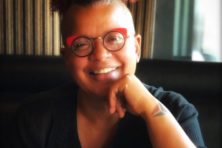Hal Prize Nonfiction Screening Judge: Jan Wrede
- Share
- Tweet
- Pin
- Share

We asked the group of local screening judges for the Hal Prize to share with readers and writers what they’re looking for when they go through submissions: Why does one piece of writing make it to the final round, but not another? These columns will illuminate the screeners’ process and help those who want to improve their writing – and are perhaps writing with the intention of submitting their work to the contest.
I’d like to begin with encouragement by paraphrasing something I learned this spring in Jeremy Owen’s class at Write On, Door County: “There is only one of you. Your voice is unique and will be lost forever if you don’t use it. You don’t even have to believe in yourself or your work. You simply must use the urges that motivate you and write.”
As an environmental educator, community organizer and nonfiction writer, I’ve spent a lifetime devoted to having a positive impact on my world. Consequently, I am most interested in reading something that informs and uplifts.
As a Hal Prize nonfiction screening judge, I look for something new or a fresh angle on a well-known topic. It is not an easy task to pare the many entries down to 20, which are passed on to the nonfiction judge. The Hal Prize rules require quick disqualification if a writer’s name is on the entry, so don’t make this mistake.
Each of us has our own unique writing manner and style, and I don’t wish to interfere with what works for you. My suggestions here are what I have found useful.
First, ruminate on what it is you truly wish to say. Ask yourself probing questions. Do I have a passion for my subject? Am I writing about an issue of intrinsic and widespread value? Just how important is this to me and others? You may need to try a new topic.
As you begin, find a way to engage your reader immediately. The title and first lines are meant to capture attention. At least in your first draft, go big. Throw yourself out there, and don’t hold back. You can always make modifications in later drafts.
Stay focused throughout the piece. This is easiest if you feel invested in the topic and are in a conversation with your audience. Work to maintain a sensible flow of your words. Write from your heart, and pull the reader along your journey. It’s also important to remember that your readers have different levels of knowledge and concern for your topic. Make sure that what you are writing makes sense to anyone who has not researched and studied this topic as you have.
Your conclusion can come in many forms. Make a plan. Sudden surprise? A grateful “Ah hah”? The reluctant “Oh, yes, of course”? Whatever the conclusion, make sure it is connected to your title. You might choose to go back and rewrite the original title.
Editing is essential! Read and edit what you have written again and again and again. Invite a friend, relative, expert – anyone who can help you by commenting on what you have written. We don’t do our best alone. You can’t have too many eyes looking at your story. Also, never forget or doubt that correct grammar and spelling can be essential to meaning. Find a good copy editor.
Finally, find a private space, and read your piece aloud to yourself. Keep reading aloud and editing until you can get through the whole thing without stopping to make a change. Because during this process I might inadvertently make a grammatical or spelling error, I find it useful to ask my gracious copy editor (who is my sister) to reread what I have written one more time.
After the final edit and before submission to the Hal Prize competition, check to make sure you have followed all of the Hal Prize rules.
I wish you the best of luck and look forward to reading your nonfiction submission. And if you win or don’t even enter this time, keep writing.
Jan Wrede has published four nonfiction books, the most recent being Outspoken: The Olly Neal Story by Olly Neal Jr. as told to Jan Wrede.
Learn more and submit to the Hal Prize here>>




